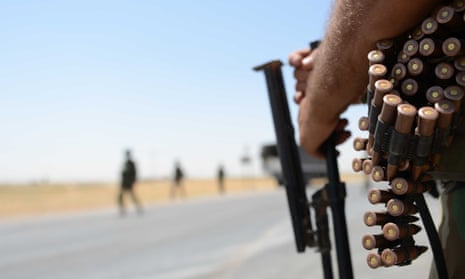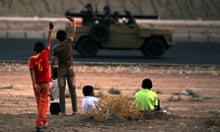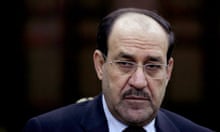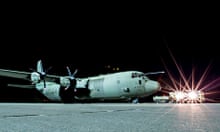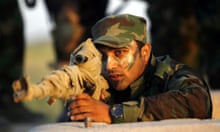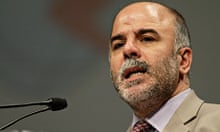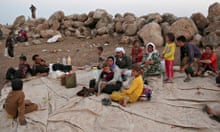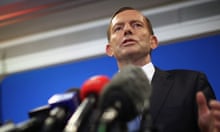The Obama administration has announced it will arm the militia forces of Iraqi Kurdistan, to prevent the fall of the final bastion of pro-US territory in Iraq.
The weaponry is said to be light arms and ammunition, brokered not through the Department of Defense – which supplies Baghdad and its security forces with heavy weaponry – but the CIA, which is better positioned to supply the Kurdish peshmerga with Russian-made guns like AK-47s that the US military does not use. The news was first reported by the Associated Press.
US officials say they are not currently considering providing Kurdish forces, which are not under the control of the Iraqi government in Baghdad, with missiles, armored vehicles or helicopters. The move to arm them raises questions about how the US-provided rifles will affect the military balance against the Islamic State (Isis), which has captured US-supplied armored Humvees and other heavy weapons from the Iraqi military.
The CIA declined to comment.
The idea of arming the Kurds has been the subject of weeks of internal deliberation and official silence by president Barack Obama’s foreign policy advisers. It is a fateful step in Iraq’s current crisis, one that risks facilitating the long-term disintegration of Iraq. Several administrations over decades have refrained from arming the peshmerga due to concerns about reprisals from Saddam Hussein and his successors. US officials have demurred for days when asked about the deliberations.
It provides an opportunity for Obama to use a proxy for confronting Isis on the ground – a step Obama has said he is unwilling to take with US forces – which defense analysts consider the only way to dislodge Isis from territory in north and central Iraq the group has seized since June.
Unlike the Iraqi security forces, comprised overwhelmingly of Arab Iraqis and nominally loyal to the Baghdad government, the peshmerga have stood and fought the better-armed Isis, although they fell back to the regional capital of Irbil after an Isis push last week to threaten the autonomous provinces of Iraqi Kurdistan. With the cover of days’ worth of US air strikes on Isis vehicles and artillery, peshmerga forces are said to have taken back two Kurdish cities from Isis on Sunday and enabled the extraction of 20,000 Yazidis trapped by Isis atop a mountain without food or water.
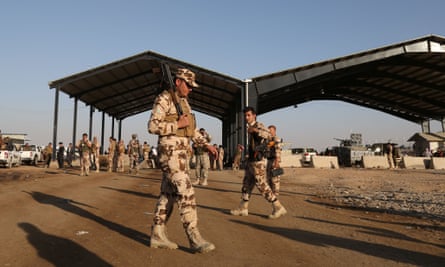
US warplanes struck again in support of the peshmerga near Irbil late Sunday, US Central Command announced Monday. Around 4pm local time, fighter jets “struck and destroyed” vehicles part of an Isis convoy advancing toward peshmerga lines defending Irbil.
The danger is that arming the peshmerga will facilitate a permanent fragmentation of Iraq, something the Kurds consider a national aspiration. Several disputed and multi-ethnic cities in northern Iraq complicate any peaceful cleavage, as do major oil holdings in both Kurdish and contested territory. The Peshmerga used the June disintegration of Iraqi army forces running from Isis as an opportunity to seize disputed areas like oil-rich Kirkuk.
In keeping with Obama’s approach to use the promise of weapons to incentivize Baghdad to make favorable political choices, administration officials are also discussing backfilling any weaponry to the Kurds provided by Baghdad, considered a step toward mitigating any decisive split between Baghdad and Irbil.
A US defense official pointed with encouragement to the “unprecedented” delivery of three plane-loads of ammunition to the peshmerga, calling it “a signal of growing cooperation”.
“The US will work to continue to push supplies forward to ISF and peshmerga to respond to the threat of [Isis]. The US government is coordinating with the government of Iraq to help fill these requests as quickly as possible,” the defense official said.
A separate track, one seemingly more immediate as peshmerga fighters line trenches to battle Isis, will come from US intelligence providing guns directly. Unlike the Syrian rebels whom Obama for years declined to arm – a decision that is now the subject of sharp recrimination for ostensibly clearing a path for the rise of Isis – US forces have known and worked closely with the peshmerga for a generation, albeit with diplomatic distance.
The US has about 40 special operations “advisers” in Irbil – which until last week was a rare patch of Iraqi tranquility – in a “joint operations center” established by Obama to coordinate intelligence and targeting against Isis. Unlike the other center, in Baghdad, there are no Iraqi military officers there, only peshmerga. Yet the center is said not to be the place where weapons transfers will occur.
Observers said arming the Kurds carries an inevitable tension with diplomatic attempts to encourage an inclusive successor government in Baghdad, which the Obama administration considers a prerequisite for draining Isis of Sunni Iraqi support and a durable victory.
“If you arm the Kurds now, and I think you have to, I don’t think there’s any other way around it, you’re putting a finger on the scales of Iraq’s internal political disputes,” said Michael Hanna of the Century Foundation.
“They’re going to be retaking territory that’s part of the disputed territory. You’re basically shoring up one side of that political divide.”
